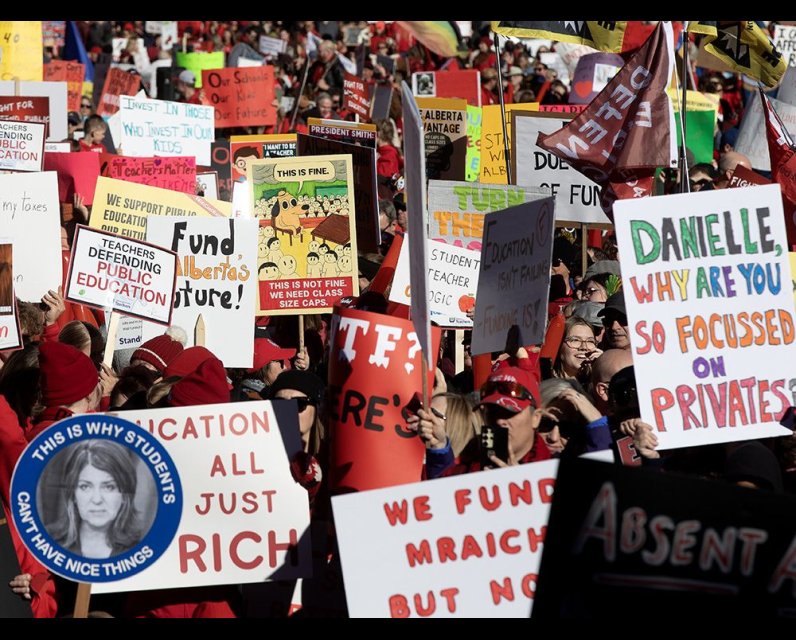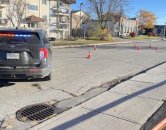Alberta teachers' strike reveals need for education revolution

Teachers in Alberta’s public, Catholic and francophone schools — all mandated members of the Alberta Teachers’ Association (ATA) — are on strike. That means the doors are closed to more than 700,000 public school students, causing massive disruption in families’ day-to-day lives. Meantime, for students and educators at the province’s non-unionized K-12 charter and private schools, it’s business as usual.
Public education purists complain when public dollars are diverted to fund the construction or operation of charter or private schools. So, it’s no surprise that this strike action has amplified their call on the province to dial back the options and invest more in public schools. Already, a referendum petition has been tabled by a Calgary teacher, asking if the Alberta government should end its current practice of allocating public funds to accredited independent (private) schools.
While nearly everyone empathizes with the challenges in the classrooms for these 51,000 ATA teachers — overcrowding and complexities made worse by Alberta’s booming population growth — the idea of taking education choices off the table for families feels like a step backwards.
“I think it’s a failure of imagination,” agrees Hamilton-based K-12 education expert Joanna DeJong VanHof. “The overcrowding and the complexity within public education classrooms is very real, and it’s very challenging,” she acknowledges. But, she adds, it’s a failure of imagination not to see how we can do education better, deploying Alberta’s charter and private schools as part of the solution to those challenges.
Choice in education is often framed as a “conservative” value, Joanna acknowledges. Yet look across Canada, she suggests, and you’ll find support for independent education across jurisdictions with a range of political affiliations. In western Canada, for example, it’s not just Alberta that funds private school options; B.C. and Saskatchewan also provide significant funding.
Currently, Alberta provides the highest level of funding to private schools (70 per cent of what public school students receive). It varies among other provinces; Ontario provides zero dollars.
Joanna studies independent education options — all part of her role as education director with Cardus, a non-partisan, faith-based, think tank with offices in Hamilton and Ottawa. She’s also a PhD candidate with the Ontario Institute for Studies in Education, researching ways to ensure accountability within these alternative education systems.
“Parents do want options,” Joanna concludes. “Even in Ontario, where there is no funding provided for independent (private) schools,” she reports, “the appetite for alternative educational options continues to grow. The number of independent (private) schools that exist in the province also continues to grow. Parents are finding ways to access those when they feel they need them, despite very formidable barriers.”
Beyond private schools, Alberta is unique in the country in offering families another K-12 option: charter schools. While most provinces offer parents a binary choice — public vs. private K-12 education for their kids — the free-enterprise government of former premier Ralph Klein made a third option available in 1994.
Charter schools offer publicly funded education where no tuition can be paid and the teachers in the classroom, qualified like all other educators, teach the Alberta curriculum but aren’t unionized. An added feature of these schools is their unique charter, for example, teaching through the lens of the arts, STEM, or a particular pedagogy (but not religion).
Joanna is one of the rare education experts in Canada who has closely examined Alberta’s charter school option.
“We know that demand (in Alberta) is very high for charter schools and independent schools. Families want these options … there are currently waitlists,” Joanna says. And there’s an offer from the province of Alberta, she notes, to enable charter and private schools to help with some of these capacity issues.
Joanna has done her homework. Last fall, to address exponential growth in the province, Premier Danielle Smith announced an $8.6 billion K-12 accelerator program to kick-start school construction and modernizations. A portion of the funding was committed to pilot a charter school accelerator program, to add 12,500 new charter school student spaces over four years.
“Independent schools have the ability to be much more nimble and flexible,” Joanna asserts, “and can have those shovels in the ground much quicker and so they can be part of the solution to some of the overcrowding.”
Rather than focusing on petitions and zero-sum arguments about how education options take public funds away from the public education system, Joanna suggests, let’s focus instead on how to best meet the needs of all Albertan families and meet them where they’re at. “Clearly the waitlists have doubled and tripled for charter education and also for independent education,” she says. “So, let’s unleash that opportunity.
“Alberta is a province that has, from its very inception, from its very history, been one that has embraced ideas of availability of choice in education,” Joanna observes. “Alberta’s spirit of innovation, willingness to try new things, are probably a part of the charter school initiative and drive.”
The wider cultural narrative we’ve adopted around education in Canada — the zero-sum, public vs. private education debate — hasn’t been that helpful, Joanna laments. “It’s a kind of circle that we can’t get out of,” she says; it’s a difficult cultural narrative to displace.
Let’s reframe the conversation, Joanna suggests, to ask: “What is education ultimately for? What is its purpose? Why do we do it?” For her, education should be about the formation of humans, about flourishing, and in order to achieve that in a diverse country like Canada, that means having educational options for families.
Our website is the place for the latest breaking news, exclusive scoops, longreads and provocative commentary. Please bookmark nationalpost.com and sign up for our newsletters here.




Comments
Be the first to comment